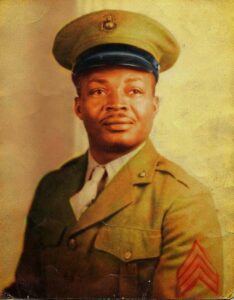The First Black Marine: Alfred Masters

June 1942 was a watershed year in history: The Battle of Midway, one of WW II’s most decisive, forever stopped the Japanese relentless expansion across the Pacific, placing their armed forces on the defensive until ultimate defeat. On the home front, in a first step down the long road to racial equality and the obtainment of long denied basic civil rights, black Americans would now be permitted the opportunity to serve their country by enlistment in the U.S. Marine Corps, a privilege heretofore unavailable to the Negro race since the Corps was reestablished in 1798. Assailed by inexorable social, political and economic pressure, and wartime pragmatism, President Franklin D. Roosevelt and Secretary of the Navy Frank Knox had forced a reluctant and recalcitrant Corps to reverse their historic policy and comply as directed with the enlistment of blacks.
In the spring of 1942, orders went out to the Marine Corps Reserve Districts to begin black enlistment on June 1st. On that date, at precisely 12:01 in the morning, 26-year-old Alfred Masters, a black civil service employee at the Army Supply Depot, accompanied by his wife, Isabell Arch, proudly raised his right hand in the Oklahoma City post office and became the first of the approximately 20,000 “colored” Marines that famously served their Corps and country. These enlistees trained at Montford Point, an all-Black, segregated training center from 1942 to 1949. Montford Point was an isolated six-square mile, segregated enclave aboard Camp Lejeune, adjacent to Jacksonville, NC. It, however, was unfinished in June, and for two- and one-half months the first enlistees found themselves assigned to the inactive reserve until they could be called up and ordered there for duty. Even when the Camp was essentially completed, with the first recruits reporting on August 13th, 1942, the myriad service support, academic and administrative functions required of an operational camp were yet unmanned. For these roles, the Corps looked for recruits of character and capabilities that would be of immediate use. This was a select group.
It can be said of them, particularly the early arrivals, that they were more mature, better educated, more professionally experienced-some even with prior military service-and more physically fit than their white counterparts. These “Montford Point Marines” from the beginning enriched the Corps, although their value at first was not effectively recognized or exploited Corps-wide. Such was Alfred Masters, a member of this select group. Born in Palestine, Texas on February 5, 1916, he and his siblings were raised on poor farms in Wewoka, Oklahoma by their widow mother, Lettia Masters–their father, Joel Masters, having died when Alfred was only five months old. Like his mother, Alfred was an expert with a shotgun, and received his first rifle at age eight. Upon enlistment, he was married with one daughter, had a solid civilian work record, four years of college, and was inured to challenging, physical labor. Reporting to Montfort Point on November 17th to Battery “A” of the 51st Composite Defense Battalion for recruit training, he was only three days behind iconic SgtMaj Gilbert H. (“Hashmark”) Johnson, for whom the camp would be later renamed in 1974. (The camp, following its use as a black training facility and integration, initially became the home of the Marine Corps’ Supply Schools.)
Masters thereafter served his Corps honorably and capably, at Montford Point in the 51st, the camp Headquarters Battalion, and in the Stewards Branch Battalion and, subsequently, in the 52nd Defense Battalion, with which he deployed overseas to Majuro in the Marshall Island Group and Guam in the Marianas. By November 1944 he had been advanced to the second highest enlisted paygrade because of his exemplary service, that of a Technical Sergeant in the Commissary Branch, then equivalent to a line Gunnery Sergeant. His fellow Marines (including those under his command) said of him that “he was stern but fair… knew how to demand excellence…men liked him.”
Returning to the States, he was discharged at Camp Pendleton, CA, on the 23rd of December 1945, after which he returned to his wife, Isabell, and now, three daughters, Shirley Jean, Alfreda Dean, and Cora Lavonne, in Oklahoma City, having completed 38 months of honorable, creditable service.
His post military years were spent teaching agriculture, working in labor intensive occupations (where he rose to leadership positions), and as an entrepreneur before returning to the land to farm his own 200-acres in Vado, New Mexico. As solid a model citizen as he had been a Marine, throughout his life he fought for his rights and those of others, either as an individual or on a team. He died on June 16th, 1975 in New Mexico. At the time, he was married to Mary Hendricks, and had five additional children (Mary Ann, Kathryn Louise, Carolyn Donata, Otto Joe, and Alfred Dan). Along with his other Montford Point brothers-in-arms, Alfred Masters was awarded the Congressional Gold Medal, albeit posthumously, on June 27th, 2012. The contribution of the Montford Point Marines is aptly reflected in the citation on the back of the medal: “for outstanding perseverance and courage that inspired social change in the Marine Corps.” Alfred Masters will always be remembered as having been the first.
REFERENCES
G.W. Carr and J.E. Greiner. Completion Report Covering the Design of Camp Lejeune U.S. Marine Barracks…Contract NOy 4751, April 15, 1941-September 30, 1942. Durham and Baltimore: Carr and Greiner, 17Jul1943.
Fred de Clouet. First Black Marines: Vanguard of a Legacy. Nashville: James W. Winston Pub. Co., 1995.
Edward J. Evans, Sgt USMC. “Men from Montford Point, “Leatherneck, Nov1947.
Gilbert H. Johnson, SgtMaj USMC (Ret). Transcript of Interview by Oral history Unit, History and Museums Div., HQMC, dtd 27-28 Jun 1972. Oral History Collection, Marine Corps Historical Center, Wash., DC.
Alfreda Dean Masters, Daughter of Alfred Masters. Additional Material.
Amberly Pozzi. “Montford Point Marines Honored with Congressional Gold Medal,” The Daily News, 1Jul2012.
Henry I. Shaw, Jr. and Ralph W. Donnelly. Blacks in the Marine Corps. Washington: History and Museums Div., HQMC, 1975.
L.A. Wilson, Sgt USMC. “MPC Leathernecks Fete 3rd Anniversary in USMC,” Globe, 29Aug1945.
Posted on: May 28, 2021


